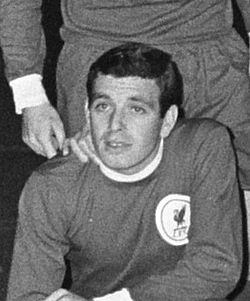 Callaghan in 2016 | |||
| Personal information | |||
|---|---|---|---|
| Full name | Ian Robert Callaghan | ||
| Date of birth | 10 April 1942 | ||
| Place of birth | Toxteth, Liverpool, England | ||
| Height | 1.70 m (5 ft 7 in) [1] | ||
| Position | Midfielder | ||
| Senior career* | |||
| Years | Team | Apps | (Gls) |
| 1959–1978 | Liverpool | 640 | (49) |
| 1978 | → Ft Lauderdale Strikers (loan) | 20 | (0) |
| 1978–1981 | Swansea City | 76 | (1) |
| 1979 | → Canberra City (loan) | 9 | (0) |
| 1981 | Cork United | 2 | (0) |
| 1981 | Crewe Alexandra | 15 | (0) |
| Total | 762 | (50) | |
| International career | |||
| 1966–1977 | England | 4 | (0) |
| * Club domestic league appearances and goals | |||
Ian Robert Callaghan MBE (born 10 April 1942) is an English former professional footballer who played as a midfielder. He holds the record for most appearances for Liverpool [2] and the FA Cup. [3] [4] He was appointed a Member of the Order of the British Empire (MBE) in the 1975 New Year Honours.
